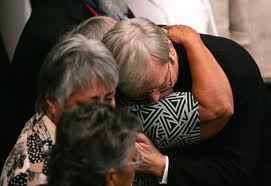First
of all bloggers, I have to tell you that the book written by Sherman Alexie, The bsolutely True Diary of a Part-Time
Indian, is one of the best books I had ever read. It is incredible how you
can go on with the reading without noticing it. So I am going to talk about
some parts of the book that I found interesting, nice and that made me reflect
about it.
In deep, the book is for me
kind of sad because the history of this boy, Junior, shows the real life that
most African-American people had to go through. This means to live in poverty,
have no opportunities as “whites” do, have no chances to achieve their dreams,
suffer bullying… Also it is still being a problem in the relationship between “whites”
and African-Americans.
There is a part in the book,
in the beginning, where Junior refers to the worst thing of being poor: His
family could not pay the vet for saving Oscar’s life, Junior’s dog, so his
parents decided to sacrifice him.
“It
sucks to be poor, and it sucks to feel that you somehow deserve to be poor. You start believing that you’re
poor because you’re stupid and ugly. And then you start believing that you’re
stupid and ugly because you’re Indian. And because you’re Indian you start
believing you’re destined to be poor. It’s an ugly circle and there’s
nothing you can do about it.” (2007: 13)
For me it is too sad to
think that those people, those children were so discriminated that they had to
think the same way as Junior did, believing that they have no chances for
having a dignified life. I cannot get through the thoughts and acts of “white
people” by making that person’s life a shit (sorry for the expression, but that’s
how it really was). They are humans just like them, and the worst thing is that
there are still existing people that discriminate and are parallellism and the
KKK is an example.
How could they understand
that the way they thought was wrong?
Nevertheless, a good example
of changing the point of view about the bad life that Indians had is Mr.P,
Junior’s teacher. He realized that people like Junior and Mary (his sister) had
a lot of talent and intelligence, so they should have the chances and
opportunities to have a better life or the life that they wanted to have. Mr.P taught
Junior to fight for his dreams and never lose hope because hope is the value
that most of Indians had lost.
““All
these kids have given up,” he said. “All your friends. All the bullies. And
their mothers and fathers have given up, too. And their grandparents gave up
and their grandparents before them. And me and every other teacher here. We’re
all defeated.” Mr.P was crying. I
couldn’t believe it. I’d never seen a sober adult cry.
“But
not you,” Mr.P said. “You can’t give up. You won’t give up. You threw your book
in my face because somewhere inside you refuse to give up.”” (2007: 42)
This made me think that what
Mr.P refers to is absolutely true because most African-Americans had given up
and that is why they stop fighting for their rights. They believed so deeply
that they were like nothing because the life, the society made them think that
way. It is a sad reality, but those like Junior, who had not lost hope, can go
on and do something for those that are lost and defeated and stand them up again
to fight for what they deserve. All people should know that everybody deserves
a life worth living.
What do you think about this
sad reality? Are values like, hope,
solidarity, empathy, love, lost? I hope not.
It is an amazing book, I
highly recommend it.
Here I let you a trailer of a
11th grade lit project. It shows some scenes of the book:




